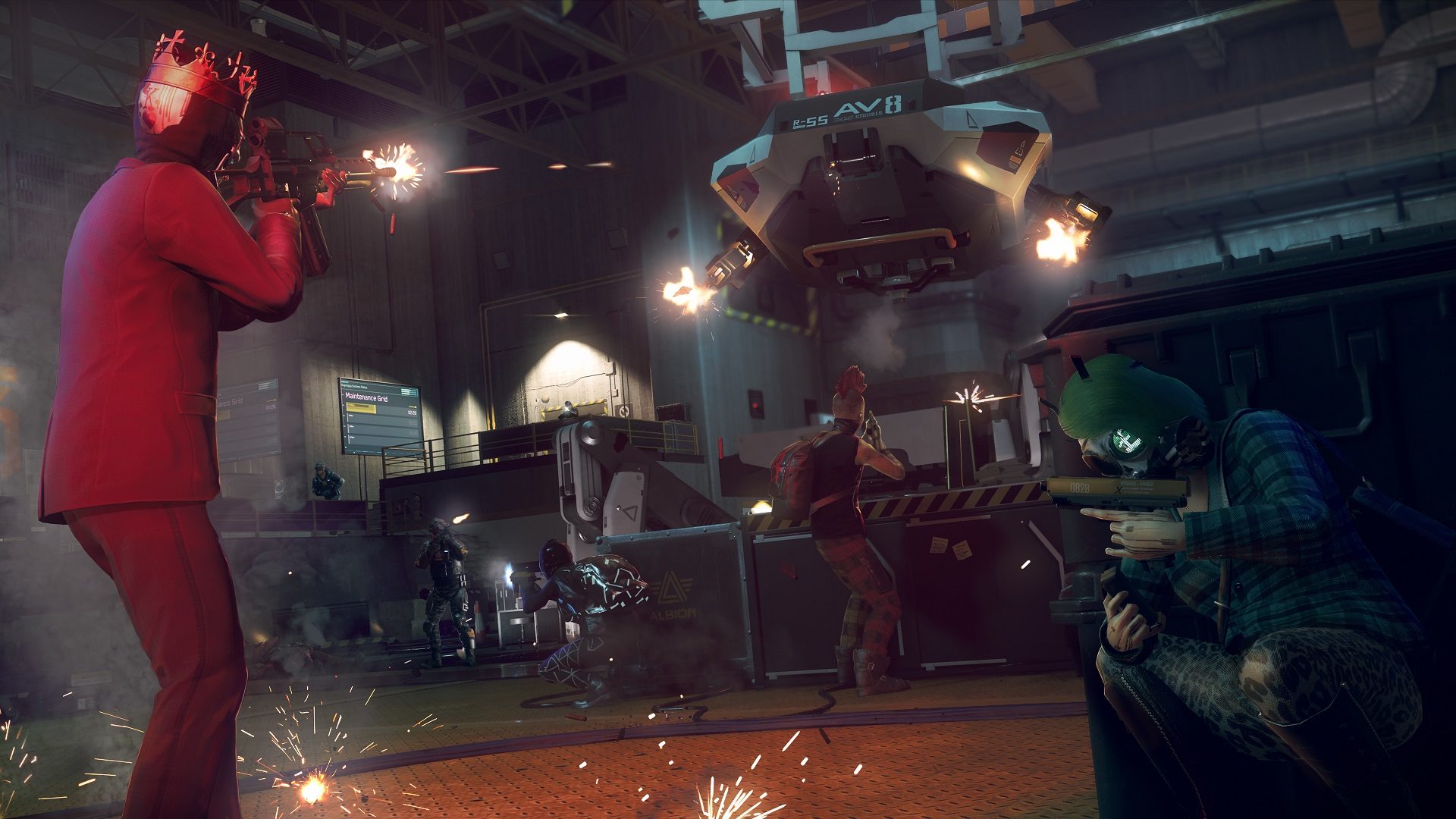In a multiplayer landscape dominated by time-vacuuming season passes and endless grinding, Watch Dogs: Legion Online, launching March 9th, is hoping to offer something a little different.
“When we were building Online, we really wanted it to be like a classic—the way I always looked at—was fun, old-school couch co-op,” said live producer Lathieeshe Thillainathan. “You have relaxed, sit-down play and you have a little bit of fun and then you go on with your day. We wanted that kind of time commitment when you’re playing online and not be so stressed about spending 7 or 8 hours to get through a particular mission.”
Legion Online is the game’s multiplayer component, one that’s completely separated from the main single-player campaign. You’ll recruit a new team and complete missions built solely for the online portion. It’s still the same sandbox London from the main game, but every bit of content in it has been built specifically for Online. It’s a more straightforward and casual version of live-service multiplayer that’s refreshingly antithetical to the common wisdom, driven by executives and investors, of what “works,” especially in the context of Ubisoft’s own stable of never-ending games like The Division 2, Rainbow Six Siege, and Ghost Recon: Breakpoint. Even its other significant single-player offering, Assassin’s Creed Valhalla, is getting constant updates with new modes and gear.
There’s plenty of reason to be skeptical. Legion Online has all the apparent trappings of another live-service obligation rearing their ugly heads. There’s a season pass. There’s a premium shop. There are—gulp—raids in the form of Tactical Ops. But each of these features that could potentially exclude the more casual player has its counterpoint. The season pass is free and leveling it up doesn’t take that long. The cosmetics available in the premium shop can be used in single-player and multiplayer interchangeably. The raids aren’t locked by a power level, because there is no power level. They’re just really hard missions.

Yet the question of “engagement” still lingers. Back in the day, people would keep coming back to a game simply because it was fun. But nowadays, if people don’t feel obligated to play something because they already dumped money into a season pass and they have FOMO if their character isn’t the highest level, they might be seduced by the siren call of the thousands of other games that exist.
The answer to that is what made Legion’s single-player so memorable, and that’s the play-as-anyone mechanic which allows players to recruit any NPC in the game’s version of dystopian London to their team of DedSec operatives.
“The way we looked at it is that play-as-anyone felt really good in a co-op experience,” Thillainathan said. “Bringing any one of your operatives into a co-op session and having… other players bring in their own team and really create a unique experience that way [was] where we felt we could find a niche.”
Playing as anyone is also at the core of Legion Online’s engagement strategy, as Ubisoft Toronto plans on regularly updating the game with new operatives to find and recruit.
“The things we want to add in terms of how to keep players engaged was all about our operative design and releasing free operatives and having you go and update your team,” Thillainathan said. “So we really focused on having you go through and recruit new operatives as part of, you know, seasonal updates or special events that we’re doing for free.”
Similarly to how the recruitment of new operatives has been tweaked for Legion Online, operative design has also been changed to better reflect the nature of online play. Thillainathan said that some “core abilities” that operatives might have had in single-player will be more “bespoke to online.” This gives the development team “more flexibility in the future” when coming up with new operative designs and “more specific online abilities.”
Because of these changes, your single-player game and your multiplayer game will be almost completely separate. You also won’t be bringing your DedSec team over from your single-player campaign, as the DedSec crew you’ve assembled online is locked to your online team.
“When we first started conceiving what online could be [for Legion], we started from play-as-anyone,” Thillainathan explained, “and a lot of the changes that we made is that we felt in order to have play-as-anyone be a strong, motivating thing for Online, we needed to give it space to breathe.”

This is a massive difference between Legion Online and the kind of online multiplayer options that the prior two Watch Dogs provided. The original Watch Dogs let players invade other players’ campaigns at random, and the second game built upon that while adding standard co-op where up to four players could explore the host’s instance of the Bay Area. Letting players invade and disrupt the single-player world of another player and kill an operative in permadeath mode could be pretty annoying.
“Early on, we felt that was the right move, rather than trying to make a single-player experience online, [make] the online experience co-exist [with single-player],” Thillainathan said. “At the same time, we also felt that when you’re playing single-player, we wanted you to not be distracted by all the live services and online. We just wanted you to experience the single-player and have a good time and experience the story.”
This involved reworking a lot of the core systems of Legion’s gameplay in a bespoke way for the online portion. Playing as anyone, for example, works slightly differently than it does in Legion’s single-player. You won’t be going on extended side missions to convince NPCs that joining DedSec is the best way to fight against the privatized militarization of London’s law enforcement. Instead, you’ll recruit them by simply scanning them and spending a certain amount of the influence points you earn by completing missions. You can still search for that special someone who has the perks and weapons you want, but you won’t have to jump through as many hoops to get them once you find them.
I got to go hands-on with Legion Online for a few hours and see how these changes played out. There’s a decent amount to experience in the online version of London; you can find plenty of smaller tasks to complete by just trucking around the map with your pals in free roam. But the core of Legion Online’s activities is much more directed.
There are two main aspects of Legion’s co-op experience: Missions and Tactical Ops. Both can be played with up to three other players, but they offer pretty different experiences, in depth and in difficulty.
Missions are similar to what you might expect from Legion’s single-player, except that you can play through them with friends. Infiltrate a place, do a thing, then get out. There’s flexibility in how you handle these missions, whether you coordinate a stealthy approach with the rest of your team or go in guns blazing. As you might imagine would happen with three randomly assigned teammates, most of our missions devolved into extended firefights with Albion and Clan Kelley. Stealth was possible, and we achieved some pretty amazing results considering the circumstances, but more often than not we were murdering countless bad guys in the pursuit of DedSec’s goals.

This is one of the places where Legion’s single-player design might be at odds with what the team is trying to accomplish with its online portion. The last couple of Watch Dogs games have moved away from the idea that your player-character is a ruthless killer, giving players way more options to perform non-lethal takedowns or avoid combat altogether. In Legion, hacking feels great, stealth feels great, and the combat is fine, but a third-person shooter it is not.
This was especially apparent in Tactical Ops, Legion Online’s simplified version of raids. Tactical Ops are extended, multi-part missions that provide the most difficult challenge and the only real narrative that you’ll find in the co-op experience. The Tactical Ops we faced during the preview event tasked us with infiltrating a pretty standard base, facing off against drones that needed to be hacked before you could even damage them, protecting a teammate as they flew a drone through a server farm, breaking into the Tower of London to gain access to a secret underground facility, and finally facing off against a boss.
Most of these missions, by design, forced us into extended combat situations. Legion’s combat is fun, but these fights—especially the Division-esque boss fight—dictated the kinds of operatives that you should play as. It’s probably possible to play as an elderly hacker, for example, but that would be a really bad choice for most players. Again, these missions were fun, but they veer dangerously close to feeling like they could have been in any third-person shooter, and Ubisoft already has plenty of those.
The other mode we played during the preview was the Spider Bot Arena, Legion Online’s PvP offering at launch. Some might see Spider Bot Arena as some kind of throwaway distraction for when you get bored with completing missions. After all, how much mileage can you get out of Spider Bots jumping around and destroying one another? But this little PvP mode ended up being one of the most fun parts of my time with Legion Online.

The idea is simple: Four spider bots try to get as many kills as possible in a deathmatch. But there’s a classic shooter attitude towards how it works. You start with basic machine guns and can collect power-ups that temporarily give you new weapons like lock-on missiles and one-hit-kill lasers. Mobility is key, and using the spider bot’s jumping and scuttling is key to surviving and getting the best of your opponents. Maps are pretty small, but there’s a ton of verticality and cover for you to use creatively. Playing it with a mouse and keyboard immediately reminded me of my friends and I sneaking in games of Quake III Arena in the high school computer lab when our teacher wasn’t looking.
Funny enough, that was one of the inspirations for Spider Bot Arena, a mode that kind of happened by accident, Thillainathan said.
“It was very much a prototype that we built very quickly and then we fell in love with it,” he explained. “This one was like a random afternoon, ‘Okay, let’s see what we can do with spider bots,’ and in two days we had a prototype. And it was like, ‘It has nothing to do with anything else that we’re doing [for Legion Online], but it’s so much fun, let’s see if we can make it work.”
Sometimes, these kinds of improvised modes can be the highlights of a game. Look no further than Call of Duty: Modern Warfare’s Gunfight, which had a similar story behind its development. And like that mode, if the fans take to it, Ubisoft Toronto is more than happy to build more maps and new weapon pickups. In addition to Spider Bot Arena, Thillainathan said that the team is also working on a PvP mode that will pit operatives against one another.
Watch Dogs Legion Online is undoubtedly a fun way to experience the game’s dystopian setting, and the mission of providing players with a live-service game that isn’t trying to completely suck up all their time is an admirable one. But it is launching several months after the game’s initial release, and the buzz has certainly faded a bit. I’m hoping that Ubisoft lets Legion Online continue to be what it currently is and grow on its own terms, rather than trying to pivot if new sales and microtransactions don’t immediately meet its expectations. Casual gamers need to have some fun, too.
Images: Ubisoft

Michael Goroff has written and edited for EGM since 2017. You can follow him on Twitter @gogogoroff.